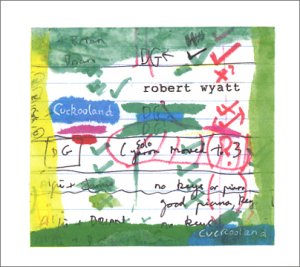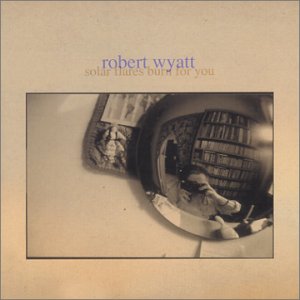#8 - Midnight Strikes in Cuckooland
"The world's gone wrong again, I need your lullaby..." -- Robert Wyatt, Lullaby for Hamza, Cuckooland
When I get so angry about the current administration that I feel exhausted, Robert Wyatt's stubbornly sad music becomes a place in which to live.
His music contains startling combinations of weariness and rage, desperateness and resolute determination. There is also a strange movement between private, interior mutterings and public events in his music that speaks to the impact of the current political situation on the personal psyche. In Wyatt's music, I find myself wrapping my mind around the paralyzing sense of shock that the past four years have brought to the American progressive. So too, the music motivates in whispers with a voice calling forth the effort to pull out of paralysis. Wyatt's music is a soundtrack for the reinvigoration of sanity. It is a wellspring of quiet insistence, a rallying song, a means to figure out how to fight, an emotional conduit for unlearning learned helplessness.
Two Wyatt albums from last year -- one new and one archival -- have been reverberating in my earphones lately.

On Cuckooland (Rycodisc), the synthesized soundscapes seem like cold, dry, hard sculptures at first, but they decay and dissolve into mist the more you listen to them. Wheel-chair bound since a fall from a window in the 1970s, the former drummer for foundational progressive rock group The Soft Machine sings in a high-pitched, weary British accent as muted trumpet and saxophone swirl around the starry, crystalline ambience of his tunes.
Even though fellow prog rockers David Gilmour of Pink Floyd and the producer Brian Eno make guest appearances on the album, the most progressive thing about the record is its politics. There is something archaic about Wyatt's music, as if it were a throwback to older times, the soundtrack to a set of reveries, dream visions, and flashes of memory. Buried in the synthesized sparkle and ooze is turn-of-the-century British ompah music hall jazz. Even when Wyatt addresses contemporary global politics, singing about children bombed in the Iraq War or animal rights, even when he does so over synthesized versions of organ pipes, wind sections, and jazzy ride cymbals, one could be waltzing to a sad tuba bleat down at the dirty vaudeville theater. Yet there, in the invocation of a past -- even a past I have never belonged to -- there is a kind of strength. The rippling echoes push us forward.

Solar Flares Burn For You (Cuneiform) is a retrospective disc of rare releases and other materials. With two BBC Top Gear sessions that Wyatt recorded in 1972 and 1974, a 1973 experimental film soundtrack (footage included on the Enhanced CD), new collaborations with Hugh Hopper, and a demo from Cuckooland, it emphasizes Wyatt's sidelong journey askance through the past thirty-odd years of pop music and the avant-garde. There's less synthesizer here, and more rickety barrelhouse piano, but as with the newer album, Wyatt's aching voice remains a constant: high-pitched, sharp, yet freighted and weary. It seems to sigh and roar, whisper and lecture, in the same note.
One of the highlights among the surrealist ditties and dissonant explorations is a fabulous cover of The Monkees' "I'm a Believer." Of course, the song is about a girl. But it's also about belief in general. As Wyatt's overdubbed voice catapults across the background of the chorus, a war cry of sorts, it restores a brightness, a gritty spark, a burning flare, to the space where "disappointment haunted all my dreams." This is the music to blare at the stump speech stop on the campaign trail through your aching, forlorn progressive soul.
15 July 2004
